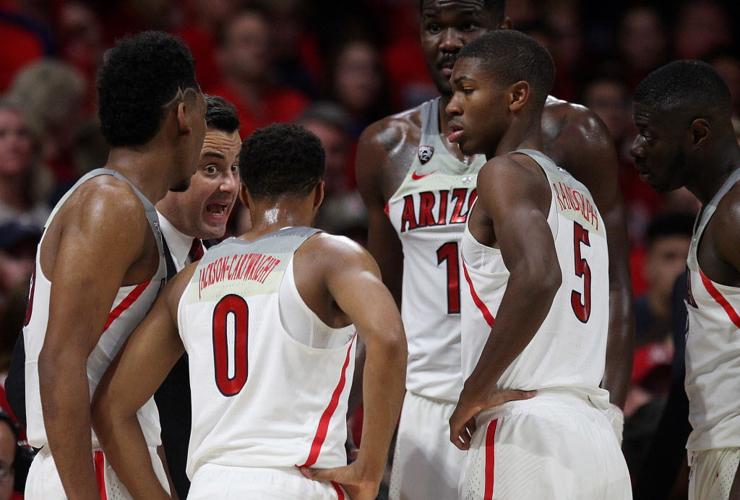As the Arizona Wildcats found out earlier this month, cramming two Pac-12 road games into 48 hours isn’t always fun.
“We had a quick turnaround, (coming off) a big win at Salt Lake City,” UA coach Sean Miller said two days after the Wildcats lost at Colorado on Jan. 6.
“That’s not an easy trip for any team.”
But history also suggests this: Having an extra day of rest between two road games, as Arizona will this week in the Bay Area, might be even worse.
Since 2010-11, Miller’s teams have won 70.6 percent of conference road games played during “traditional” Pac-12 weekends – those where only one day separates the two games – but just 61.1 percent when they have an extra day.
And, of the second game on those extended road trips, Arizona has won only 55.6 percent of the time -- though that record might also reflect the fact that television often shifts the Wildcats’ best opponent of a weekend to a Saturday or Sunday.
There’s no easy solution, either way.
So even while Miller says the Wildcats need to win every game in order to “accomplish significant things” this season, there’s also a pragmatic side of him.
“Winning both on the road, sweeping, leaving with two road victories, is not an easy thing to do,” Miller says.
“You can be a very good team and not do that.”
Like that Utah-Colorado swing.
Arizona pulled out a 94-82 win on Jan. 4 against a Utah team that just came off its first-ever sweep of the Oregon schools, and appeared in good shape to pick up a road sweep.
Some 39 hours later, the Wildcats were humbled in an 80-77 loss at Colorado.
“The last time we were on the road we had some good moments,” Miller said. “Our game at Utah was a hard-fought victory. You left that game feeling really good about how we finished. We held off a ferocious rally played against a team that was energized in front of its home crowd.
“But in the Pac-12, that’s what makes our conference so unique and so good. When you leave you’re doing it twice."
Considering the Pac-12’s spread-out geography, actually playing the games isn’t the only challenge, either.
Ryan Reynolds, who organizes the Wildcats’ travel as the UA’s director of basketball operations, said he prefers two-day breaks between games for the Washington and mountain trips because those require a flight in between.
But overall, Reynolds said, two-day breaks between games such as the one the Wildcats have this week create their own set of challenges.
Not only do the Wildcats have to leave a day earlier in the week, missing more school, but they also have to stay sharp during that two-day break in between.
The Wildcats will sleep in after their game at Cal on Wednesday, then take a midday Thursday bus ride to their Palo Alto hotel, where they will watch film and work on academics.
They’ll have a little free time and will eat at an area steakhouse Thursday night — but not too much free time.
The Wildcats had a taste of that during the 2013-14 season when several of them took an excursion to Alcatraz.
Two days later, Arizona lost 60-58 loss at Cal, one of only three regular-season losses the Wildcats had during that Elite Eight season.
While Miller said he doesn’t want to fly home between games because of the time and cost involved, some others do. Arizona State will travel back to Tempe between the Bay Area games this week.
There’s no easy way to do it.
“It’s hard on those long trips,” Reynolds said.
So how much rest does Miller prefer on road trips? When asked, he didn’t say directly, instead noting that all conferences have their scheduling challenges.
“You really can’t control it.” Miller said.
Especially when you have television partners paying you $3 billion over 12 years, the initially estimated amount of the Pac-12’s current rights deal with ESPN and Fox.
Maybe you just do what you’re told, no matter how much or how little you sit around that hotel between games.
“There are factors you have to take into consideration now that you didn’t use to,” Miller said. “You have to be able to take care of your TV partners. That’s really important.
“So sometimes maybe something that’s not as convenient for our fans or for our team, there’s an overall bigger picture that maybe benefits us in ways that we don’t think about.”





